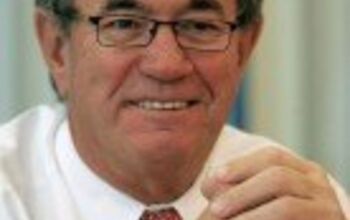Buzz Hargrove: Still Full of Piss and Vinegar (Part 2)

Buzz Hargrove doesn't mince his words. As demonstrated in Part 1 of this interview, the outgoing Canadian Auto Workers leader is fully aware of the Detroit domestics' dire financial peril. What's more, Buzz understands the balance between his members' welfare and the health of the automotive industry. Or lack thereof. "My first responsibility is to look after the interests of my members," Buzz admits. "But I tell my boys to look after the industry too. At every meeting." So, how's that going?
Not well. It's evident that Buzz Hargrove has little respect for the men who run the companies that employ his members. "We've made sacrifices. They have no sense of sacrifice."
"[Chrysler CEO] Bob Nardelli's big claim to fame, when he came in, was that he wouldn't need a big salary because of what he made at Home Depot. But today, he still won't disclose his salary." It reminds him of Lee Iacocca's first year as Chrysler chairman. "He came on saying he would only be paid $1/year. What he didn't tell you was next year he picked up $21 million. I'd take $1/year if you paid me $21 million the next year."
It's a credibility gap that irritates Hargrove and offends his political beliefs. "It's the guys at the top looking out for the guys at the top. That's capitalism."
Hargrove characterizes Ford CEO Alan Mulally and GM CEO Rick Wagoner as bright guys who understand the car business but can't get it done; they can't stop their companies' shrinking market shares. Again, Hargrove lets Chrysler's Nardelli have it with both barrels.
"I'm not convinced he's the right guy. It's a very complex industry. [Cerberus boss] Stephen Feinberg told me he hired him over Tommy [Lasorda] because he was the only one who admitted Chrysler was in trouble. That's true, but I'm not sure those are the best credentials to pick someone to run a multi-billion dollar business."
Cerberus itself was a source of controversy for Hargrove. Asked why he originally opposed the takeover and then supported it, Hargrove recounts a meeting with Feinberg. "They assured me they would continue to invest in Canadian operations."
"GM said the same thing," I counter.
Hargrove suggests it's not his fault that he took the auto execs at their word. Equally surprising, he isn't worried about the Canadian auto industry's future. I ask him if Canadian labour costs are scaring away automakers.
"That's completely ridiculous," he declares without hesitation.
"Chrysler just committed to making the new Caravan in Canada, Ford invested in Windsor, and GM committed the Impala. Labour costs are only a component. If it was such a big cost, we wouldn't have had any new investment. They've spent billions here."
You get what you pay for, according to Hargrove, citing Oshawa's quality ratings among the GM family of plants. As to what taxpayers pay for, Hargrove is unrepentant about asking for government bailouts.
"The CAW pays the educational costs for thousands of its members. We are one of the largest tax bases in Canada. When things are going well, we don't ask for taxes back. What we're asking for is our own money. All we want is for [the governments of Canada and Ontario] to respect that."
When I bring up the recent $350m investment announced by Canadian Finance Minister Jim Flaherty (and, oddly, current MP for Oshawa-Whitby), Hargrove's composure begins to fray.
"That's peanuts. That won't even open a bicycle plant. This is a billion-dollar industry."
"Flaherty never got it – not when he was at Queen's Park [as an MLA for Mike Harris' provincial government], not now."
Another political irritant for Hargrove: the current push for free trade. "The old Auto Pact turned an industry around for 20 years. The volume of imports in North America is so high, higher than Europe and Asia."
So high, in fact, that Hargrove rejects all comparisons to the heavily-unionized car industry of 1960s Britain. "It's two different industries completely." Hargrove points out that Europe and Asia didn't open their markets as freely as Canada and the USA, which gives them a huge competitive advantage on the global scale.
"They wanted to push through that free trade deal with Korea. I met with Stephen Harper and with Flaherty, and they could not disagree with me. These are free market guys. It was not a good deal for us."
Hargrove feels vindicated that the deal fell through. But he maintains that the current situation still favours foreign manufacturers.
All of which suggests Hargrove is leaving a bit of work behind for his eventual successor. Asked about the timing of his departure, Hargrove lays it out. "I've changed it so that retirement is mandatory at 65. It can be tempting to stay on too long. I have to set the example. My credibility is very important to me."

Latest Car Reviews
Read moreLatest Product Reviews
Read moreRecent Comments
- Bd2 Ultimately, it comes down to price/whether it makes financial sense for buyers (right now, BEVs just aren't there, even with the tax credit). HEVs are finally seeing their place in the sun, decades after being a niche market; this is due to premium for HEVs having narrowed significantly with pure ICE, whereby buyers can recoup that after 2-3 years of ownership.
- MaintenanceCosts I've experienced three cars that were the first year of the model. The two I bought (first-off-the-boat 2004 TSX and midyear 2006 Civic) were both Hondas and were both flawless. The other one was my ex-stepmother's 1990 Land Rover Discovery. It was one of the very first Euro-spec models, a two-door with an asthmatic carbureted 3.5L V8 and a five-speed manual. Every part of the car broke at some point, including things like hatch hinges that really shouldn't break. It turned her off Land Rover forever, and her cars since have all been Subarus.
- MaintenanceCosts When I was living with my Bolt in a rental condo and charging from 120V in the garage, as soon as the association figured out what was happening, they asked me to pay $30 a month to cover the cost. That's pretty close to what I was using so I had no issue with it.
- SCE to AUX I've had mixed results with first-year cars:71 Pinto - good. 85 LeBron GTS - good. 96 Grand Voyager - good. 02 Passat B5.5 - bad. 05 Odyssey - bad. I also had a last-year car that was terrible (80 Bobcat), but most cars were crap then, anyway.
- Crown Go big or go home. Never understood the "economy version" that manufacturers make of a performance car.


































Comments
Join the conversation
A little Googling gave me confirmation of the plant's existance and the number of jobs and a partial confirmation as to the salary. Remember, this is a parts plant, and low-tech parts (seats for the new RAV4 plant in Ontario) at that. It is not a Toyota assembly plant; Toyota Boshoku is not Toyota, and a Toyota Boshoku employee will make less than a Toyota employee will make. $16-18 an hour would be about the going rate for a non-union, low-tech, auto part plant. And, if they can't find enough people, they will have to raise their salary, won't they? Labor is a product subject to supply/demand forces like everything else.